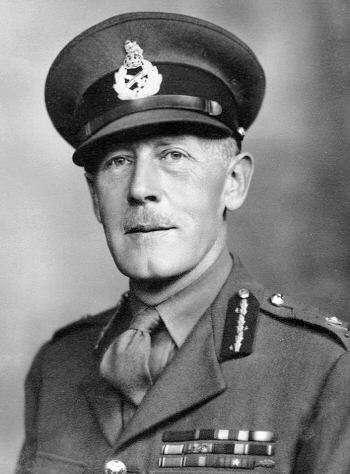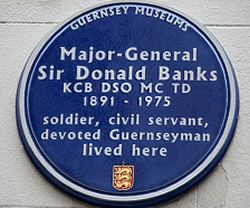
Lieutenant-Colonel Donald Banks
CO 10th Battalion & CO 8th Battalion,
Essex Regiment & Berkshire Regiment
Twice mentioned in Despatches
|
|
|
|
|
|
Distinguished
Service Order
|
Military
Cross
|
Croix de Guerre
(France)
|
1914-15
Star
|
Wounded in France
Born in 1891 at Guernsey. Son of Thomas Brownsort Banks
& Margaret Roebuck. Old Elizabethan. Knighted in
1935.
Served in 2nd World War in BEF. Maj-Gen in 1943. Founded
Guernsey Society in London. Died in Hants in 1975. EC
2916.
Guernsey Press 09/05/2023

Picture by Luke Le Prevost
A new Blue Plaque has been unveiled
to commemorate Major-General Sir Donald Banks KCB DSO
MC TD at his former home 43 High Street
Major-General Sir Donald Banks was born
in Guernsey in 1891 and grew up living above his father’s
bookshop at 43, High Street, where the plaque has been
installed. After being educated at Elizabeth College,
Banks left the island in 1909, joined the British civil
service, and went on to become a hero of the First World
War.
He rose from the rank of Private in the
London Yeomanry to Lieutenant Colonel commanding the
10th Essex Regiment. He was awarded the Military Cross,
Distinguished Service Order, Croix de Guerre and was
mentioned in dispatches twice.
On returning to the civil service after
the war, he joined the General Post Office, where he
was appointed its first director-general. From there
he was transferred to the Air Ministry, where he was
responsible for the rearmament of the RAF during the
build-up to the Second World War.
During that war, he was invited by Churchill
to establish the Petroleum Warfare Department, which
was responsible for numerous innovations, including
techniques for fog dispersal at airfields and a fuel
pipeline under the English Channel to provide petrol
to the liberating forces as they swept across Europe,
known as Pluto. It was heralded by General Dwight Eisenhower
as ‘second in daring only to the artificial
Mulberry harbours’ among the innovations developed
for D-Day. He was awarded the US Presidential Legion
of Honour for his achievements.
‘It’s wonderful to see this
Blue Plaque being unveiled to such a well-deserved and
devoted Guernseyman, said Guernsey Society vice chairman
Steve Foote. Although he never returned to live in his
native island, his love of Guernsey and the wellbeing
of the islanders was never far from his mind. In particular
his efforts during World War 2, when he formed the Guernsey
Society to keep the plight of the islanders at the forefront
of the British Government’s plans.’
The plaque was unveiled by the Bailiff,
Richard McMahon with a guard of honour provided by the
10th Essex Living History Group, who model themselves
on Banks’ WWI regiment, and the Elizabeth College
Combined Cadet Force.
It was initially supposed to be unveiled
13 years ago for the 70th anniversary of the Liberation
and another planned ceremony in 2020 was also delayed
due to Covid. A crowd of around 50 islanders were in
attendance and the rainy weather stopped in a timely
manner as the service commenced. Among those was Mr
Banks’ daughter Dawn Smith. ‘I was going
to get here when it happens even if you have to carry
me on a stretcher,’ she told the gathering.
The blue plaque scheme was launched in
2008 and recognises Guernsey people who have made an
important contribution to the Bailiwick and the wider
world. ‘It’s wonderful to be able to recognise
someone who did so much for the island and remember
parts of our history,’ said Helen Glencross,
head of heritage services and member of the blue plaques
panel.